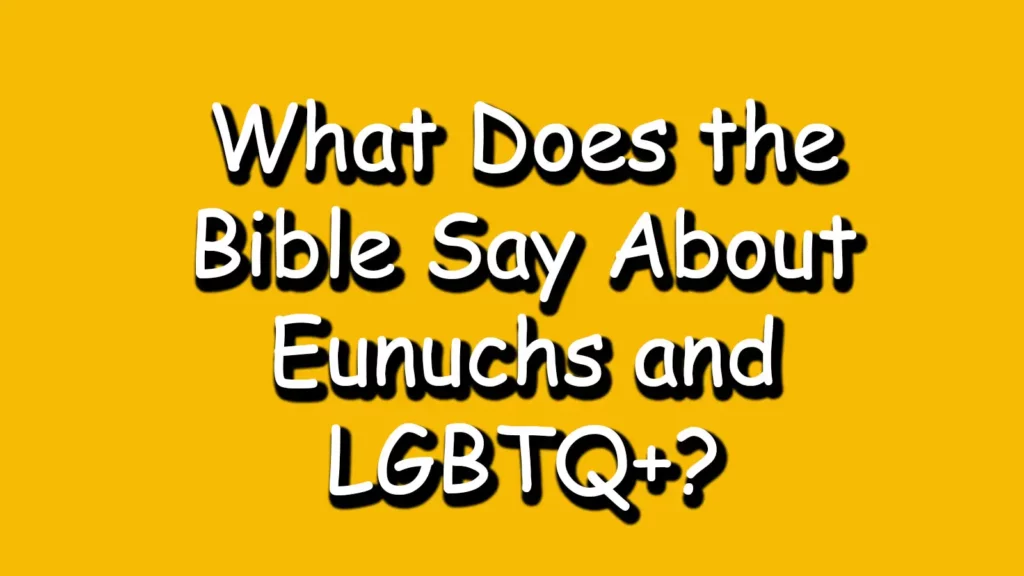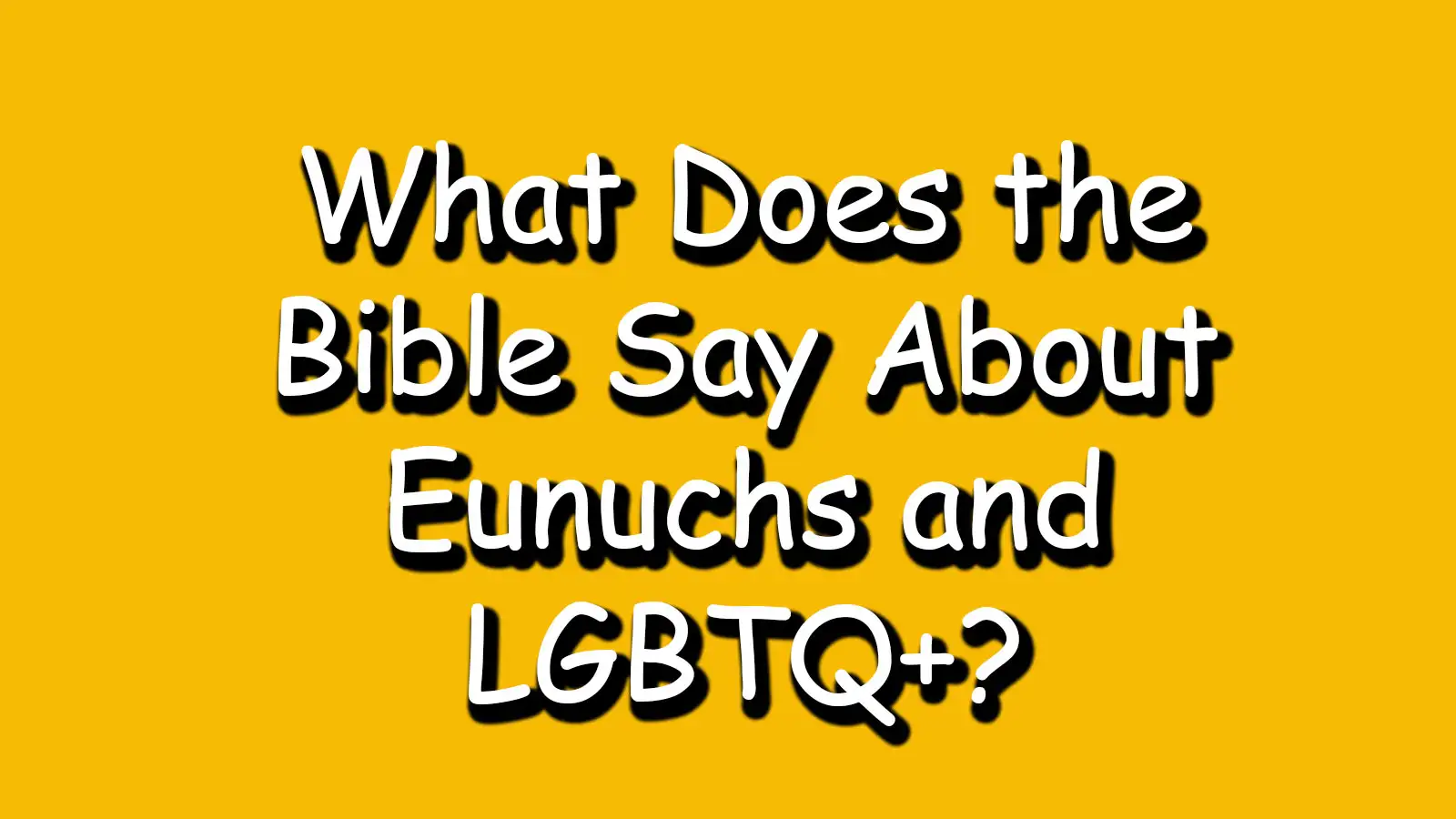When it comes to understanding the Bible’s perspective on eunuchs and LGBTQ+, it’s important to examine the biblical references. The Bible does mention eunuchs in a few instances, particularly in the Old Testament, where they held various roles such as serving in royal courts or as trusted officials. However, it’s crucial to note that these references primarily focus on physical castration rather than sexual orientation or gender identity.
As for LGBTQ+ individuals, there is ongoing debate and interpretation within different religious communities regarding how the Bible addresses homosexuality. Some argue that certain passages condemn same-sex relationships based on their understanding of biblical teachings, while others emphasize love, acceptance, and inclusion for all individuals regardless of sexual orientation.

It’s essential to approach these discussions with compassion and respect for diverse perspectives. Engaging in open dialogue allows us to better understand each other and cultivate an environment where everyone feels valued and affirmed.
The Role of Eunuchs in Biblical Times
In biblical times, eunuchs played a significant role in society and are mentioned in several passages throughout the Bible. Their presence is primarily seen in the Old Testament, which provides insights into their lives and positions.
- Definition and Background: Eunuchs were typically men who had been castrated, either willingly or forcibly. This procedure rendered them unable to bear children and altered their physical appearance. In some cases, individuals became eunuchs due to cultural practices or as a part of serving royal households.
- Service in Royal Courts: Eunuchs often served as trusted officials within royal courts, where they held positions such as chamberlains or overseers of harems. One well-known example is the story of Joseph, who was sold into slavery by his brothers but eventually rose to become a high-ranking official in Pharaoh’s court.
- Symbolic Significance: In certain instances, eunuchs are mentioned symbolically to represent characteristics like loyalty and dedication to God’s work. For instance, Isaiah 56:4-5 refers to how eunuchs who keep God’s commandments will receive blessings and an everlasting name that shall not be cut off.
- Biblical References: The Bible contains specific references to notable eunuchs such as Ebed-Melech (Jeremiah 38:7-13), who rescued Jeremiah from a cistern during the siege of Jerusalem; and the Ethiopian eunuch encountered by Philip (Acts 8:26-39), whom Philip guided towards understanding the scriptures.
- Acceptance and Inclusion: While there are no explicit statements regarding LGBTQ+ individuals in biblical times, it is important to note that Jesus preached a message of love, acceptance, and inclusion for all people regardless of their background or circumstances.
Understanding the role of eunuchs in biblical times provides us with historical context and highlights the diverse individuals who played significant roles in the societies of that era. While biblical references provide insights into their positions, it is essential to approach these texts with a comprehensive understanding of their cultural and historical contexts.
Understanding LGBTQ+ Terminology
When exploring the topic of LGBTQ+ in relation to the Bible, it is important to have a clear understanding of the terminology used. Let’s delve into some key terms that will help us navigate this discussion.
- LGBTQ+: The acronym stands for Lesbian, Gay, Bisexual, Transgender, and Queer (or Questioning), with the “+” representing additional identities within the community. These terms encompass a diverse range of sexual orientations and gender identities.
- Sexual Orientation: This refers to an individual’s enduring pattern of emotional, romantic, and/or sexual attractions towards members of the same or opposite sex or both. It is important to note that sexual orientation is not a choice but rather an innate aspect of one’s identity.
- Gender Identity: Gender identity relates to how individuals perceive themselves in terms of their internal sense of being male, female, or something else entirely. It may not necessarily align with their assigned sex at birth and can vary along a spectrum.
- Transgender: A transgender person is someone whose gender identity differs from the sex they were assigned at birth. They may choose to transition socially, medically, or both to live authentically in alignment with their true gender identity.
- Cisgender: Cisgender individuals are those whose gender identity matches their assigned sex at birth.
- Homosexuality: Homosexuality refers specifically to romantic or sexual attraction between individuals of the same sex.
- Biblical Perspective: When considering biblical references regarding LGBTQ+ matters, interpretations may differ among scholars and theologians due to varying approaches and contexts within which these passages are understood.
It’s essential to approach discussions surrounding LGBTQ+ topics from a place of empathy and respect for all individuals involved while acknowledging different interpretations within religious contexts.
While various interpretations exist on specific biblical passages related to homosexuality or gender diversity such as Leviticus 18:22 and Romans 1:26-27, it’s important to remember that the Bible is a complex text open to multiple understandings. It is crucial to engage in thoughtful dialogue and consider differing perspectives when exploring these topics.
In conclusion, understanding LGBTQ+ terminology helps us navigate discussions on this subject with clarity and sensitivity. By approaching the topic from a place of respect and open-mindedness, we can foster greater understanding and compassion for all individuals, regardless of their sexual orientation or gender identity.
Biblical Passages Relevant to Eunuchs
When exploring the topic of eunuchs in the Bible, it’s important to look at specific biblical references and their implications. The Bible does mention eunuchs in several passages, shedding light on their role and significance within ancient societies. Let’s delve into some of these biblical references:
- Isaiah 56:3-5 – In this passage, Isaiah speaks of eunuchs who keep God’s covenant and choose what pleases Him. They are promised a special place within God’s house, with an everlasting name that will not be cut off. This suggests that eunuchs can find acceptance and honor in God’s eyes.
- Matthew 19:12 – Jesus discusses different types of eunuchs in the context of marriage and celibacy. He mentions those who were born as eunuchs, those who were made eunuchs by others, and those who have chosen to become eunuchs for the sake of the kingdom of heaven. This highlights the diverse experiences and choices surrounding eunuch identity.
- Acts 8:26-40 – Philip encounters an Ethiopian eunuch while on a journey, reading from the book of Isaiah. Through this encounter, we see that God accepts and embraces individuals regardless of their sexual or gender identity.
- Galatians 3:28 – Although not specifically addressing eunuchs, this verse emphasizes equality within Christ’s community by stating that there is no distinction between male or female, slave or free person—highlighting a vision where all are equal before God.
It is essential to note that interpretations may vary among scholars regarding these passages’ relevance to LGBTQ+ individuals today. The Bible was written within specific cultural contexts, which influences our understanding of these texts.
While these biblical references provide insight into how ancient societies viewed eunuchs, it is crucial to consider the broader principles of love, acceptance, and inclusion that are central to Christian teachings. The Bible encourages us to embrace diversity and treat all individuals with respect and dignity.
By examining these biblical passages, we gain a deeper understanding of how eunuchs were perceived in ancient times and how God’s love transcends societal norms. It is through this lens that we can approach discussions on LGBTQ+ identities within a biblical context.
Interpreting the Bible’s View on Eunuchs
When it comes to understanding what the Bible says about eunuchs and LGBTQ+ individuals, it is important to approach the topic with a nuanced perspective. The Bible, as a religious text, contains passages that require careful interpretation and consideration of historical and cultural contexts.
- Old Testament References: In the Old Testament, particularly in Deuteronomy 23:1 and Isaiah 56:3-5, there are references to eunuchs. These verses primarily address restrictions on the participation of certain types of eunuchs in religious activities or their ability to enter certain spaces. It is essential to recognize that these passages were written within a specific cultural framework.
- Eunuchs in Biblical Times: In ancient times, eunuchs were often castrated males who served in various capacities such as royal officials or guardians of harems. Their roles extended beyond their physical status as they played significant administrative roles within society.
- New Testament Perspective: While the New Testament does not explicitly mention eunuchs or provide direct guidance on LGBTQ+ matters, it emphasizes love, compassion, and non-judgment towards others (Matthew 22:36-40). Jesus’ teachings focus on inclusivity and acceptance rather than exclusion based on personal characteristics or identities.
- Interpretation through Love: When interpreting biblical views on sexuality and gender identities today, many Christians prioritize an inclusive approach rooted in love and respect for all individuals. They argue that focusing solely on isolated passages can limit our understanding of God’s message of love for humanity.
Understanding biblical perspectives requires examining various factors such as historical context, cultural practices at the time when these texts were written, and overarching biblical principles like love and compassion.
While some may find specific verses challenging or even conflicting with modern understandings of sexual orientation and gender identity, it is crucial to engage in respectful dialogue and seek deeper understanding through research, prayer, and conversations with knowledgeable individuals.
In conclusion, the Bible does mention eunuchs and provides insights into their roles in ancient societies. However, when it comes to LGBTQ+ matters, interpreting the Bible’s view requires considering historical context, biblical principles of love and compassion, as well as engaging in respectful dialogue within the Christian community.
Exploring LGBTQ+ Themes in the Bible
When it comes to discussing LGBTQ+ themes in the Bible, it’s important to approach the subject with an open mind and a deep understanding of biblical texts. The Bible is a complex collection of ancient writings that reflect the cultural and historical context of their time. While there isn’t a direct mention of LGBTQ+ identities as we understand them today, there are passages that some interpret as relevant to these themes.
- Genesis 19:1-11: This passage recounts the story of Sodom and Gomorrah, cities known for their wickedness. Some interpretations suggest that this story condemns same-sex relations. However, others argue that the sin being condemned here is inhospitality and sexual violence rather than consensual relationships between individuals of the same gender.
- Leviticus 18:22 & 20:13: These verses state that “a man shall not lie with another man as with a woman” and prescribe death as punishment for such acts. It’s important to note that these verses are part of Levitical laws which also include regulations on dietary restrictions and clothing. Christians often consider Jesus’ teachings in the New Testament as superseding these Old Testament laws.
- Romans 1:26-27: In this passage, Apostle Paul discusses people exchanging natural sexual relations for unnatural ones. Many interpret this passage as addressing same-sex relationships negatively. However, different interpretations exist regarding what exactly Paul meant by “natural” and “unnatural.”
- 1 Corinthians 6:9-10 & 1 Timothy 1:10: These verses list various behaviors considered sinful, including “men who have sex with men.” It’s worth noting that scholars debate how accurately these translations represent same-sex relationships or whether they refer to specific cultural practices like prostitution or pederasty.
- Despite passages that can be interpreted in different ways, the Bible also emphasizes love, acceptance, and inclusion. Jesus’ teachings encourage us to love one another and treat others with kindness and respect, regardless of sexual orientation or gender identity.
It is essential to approach these biblical references with sensitivity and careful interpretation. Christians have diverse perspectives on LGBTQ+ themes, ranging from affirming and inclusive to more traditional interpretations. Engaging in respectful dialogue can help foster understanding and compassion within faith communities while honoring the diversity of beliefs surrounding this topic.
Contemporary Perspectives and Discussions on Eunuchs and LGBTQ+
When it comes to contemporary perspectives and discussions on eunuchs and LGBTQ+ individuals, there is a wide range of viewpoints within religious communities. While the Bible does provide some insight into these topics, interpretation and understanding vary among different scholars, theologians, and believers.
- Biblical References: In the Bible, we find references to eunuchs in both the Old and New Testaments. In the Old Testament, eunuchs were often mentioned in historical contexts as attendants or officials serving in royal courts (Genesis 39:1-23; Esther 2:3-4). Additionally, Isaiah 56:3-5 speaks about eunuchs being given a special place in God’s house.
In the New Testament, Jesus himself mentions eunuchs when discussing celibacy for the sake of the kingdom of heaven (Matthew 19:12). This passage has been interpreted by some as an acknowledgment of diverse sexual orientations or identities.
- Interpretations: Given these biblical references, contemporary discussions surrounding eunuchs and LGBTQ+ individuals often involve exploring various interpretations of scripture. Some argue that these passages offer support for inclusion and acceptance of sexual minorities within religious communities.
Others may hold more conservative views based on their understanding of biblical teachings regarding marriage between one man and one woman. These perspectives emphasize celibacy or heterosexual relationships as the ideal according to their interpretation of scripture.
- Diverse Theological Views: Within Christianity itself, there is a spectrum of theological perspectives on LGBTQ+ issues. Some denominations have taken steps towards full inclusion and affirmation of LGBTQ+ individuals within their congregations, allowing them to serve as clergy or perform same-sex marriages.
Conversely, other religious groups maintain traditional views that consider homosexual acts sinful but may still promote love and support for LGBTQ+ people while encouraging celibacy or heterosexual marriages.
It is important to note that individual believers may also hold their own personal views on these matters, which can further contribute to the diversity of perspectives within religious communities.
- Ongoing Dialogue: As society continues to evolve and attitudes towards sexuality and gender identity shift, discussions surrounding eunuchs and LGBTQ+ individuals in relation to biblical teachings remain ongoing. The interpretation of scripture is influenced by cultural contexts, historical understandings, and individual experiences.
Within religious communities, there are ongoing dialogues aimed at fostering understanding, compassion, and respectful engagement on these topics. This includes exploring new theological frameworks that seek to reconcile tradition with contemporary understandings of human sexuality and gender diversity.
In conclusion, when examining contemporary perspectives and discussions on eunuchs and LGBTQ+ individuals from a biblical standpoint, it becomes clear that interpretations vary among different scholars, theologians, and believers. While the Bible provides some references to eunuchs and offers insights into celibacy for the kingdom of heaven in relation to sexual minorities, diverse theological views exist within religious communities. Ongoing dialogue seeks to foster understanding while navigating the intersection between faith and sexual orientation or gender identity.
Frequently Asked Questions (FAQs)
1. Are Eunuchs mentioned in the Bible, and what does the Bible say about them?
Yes, eunuchs are mentioned in the Bible, particularly in the Old Testament. In Matthew 19:12, Jesus refers to three types of eunuchs, including those who were born that way, those who were made eunuchs by others, and those who choose to live as eunuchs for the sake of the kingdom of heaven. The Bible recognizes and acknowledges the existence of eunuchs, and Jesus' words suggest that God values all individuals, regardless of their gender identity or sexual orientation.
2. What is the Bible's stance on LGBTQ+ individuals and relationships?
The Bible does not explicitly use the term "LGBTQ+," as this modern terminology was not present during biblical times. Different interpretations of biblical passages have led to diverse perspectives on LGBTQ+ issues among Christian communities. Some Christians believe that the Bible condemns same-sex relationships, citing passages such as Leviticus 18:22 and Romans 1:26-27. Others advocate for a more inclusive and affirming approach, emphasizing the overarching themes of love, compassion, and acceptance found throughout the Bible.
3. Does the Bible support or condemn same-sex marriage?
The Bible's stance on same-sex marriage remains a topic of debate among Christians. Traditional interpretations tend to view marriage as a union between one man and one woman, based on passages like Genesis 2:24 and Ephesians 5:31. However, some Christians interpret these verses differently and argue for a more inclusive understanding of marriage that includes same-sex couples. The interpretation of biblical teachings on marriage varies across denominations and theological perspectives.
4. What does the Bible say about gender identity and transgender individuals?
The Bible does not directly address the concept of gender identity or transgender individuals as understood in contemporary terms. The biblical understanding of gender tends to align with a binary view, recognizing male and female identities. However, some scholars argue that certain passages in the Bible, such as Galatians 3:28, emphasize equality and unity in Christ, which can be applied to discussions about gender identity and inclusivity.
5. Does the Bible promote acceptance and inclusion of LGBTQ+ individuals in the Christian community?
The Bible contains numerous passages that emphasize love, compassion, and acceptance of all individuals, regardless of their backgrounds or identities. Jesus' teachings, such as the command to love one's neighbor as oneself (Matthew 22:39), emphasize the importance of inclusivity and treating others with respect and kindness. Many Christians believe that these principles extend to embracing and supporting LGBTQ+ individuals in the Christian community.
6. How can Christians navigate discussions about LGBTQ+ topics in light of the Bible?
Navigating discussions about LGBTQ+ topics in light of the Bible requires a thoughtful and prayerful approach. Engaging with diverse theological perspectives and seeking a deeper understanding of biblical passages through study and reflection is essential. It is crucial to approach these discussions with empathy, humility, and respect for differing viewpoints. Christians can also seek guidance from church leaders, scholars, and resources that provide insights into interpreting the Bible in the context of contemporary issues related to gender and sexuality.





Pingback: What Does the Bible Say About Transgender? - whatdoesbible.com